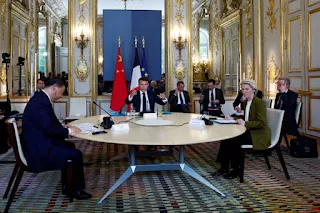As China’s special envoy for climate affairs Liu Zhenmin is about to visit the United States to restart the U.S.-China climate cooperation dialogue, a new report from a U.S. think tank found that China is benefiting from its dominance of green energy, posing a threat to the energy and national security of the United States and its allies. challenge.
Since the 1970s, China has been turning its energy vulnerability into a net advantage by implementing effective long-term strategies. Beijing has successfully dominated the U.S. energy and environmental agenda for decades as China controls an increasing amount of green energy, materials and products.
Latest report from a US think tank: China uses climate and energy issues to force the West to make concessions
As Liu Zhenmin, China’s special envoy for climate change affairs who took office in January this year, is about to visit the United States, a project called “Chinese Handcuffs” of the Heritage Foundation released a report on Monday. The report found that in order to achieve its climate goals, the United States has to significantly increase its reliance on Chinese materials and products that support the green energy transition, and this dependence is making the United States fall deeper and deeper into the trap made in China.
The report noted that Chinese leader Xi Jinping has used China’s global dominance in renewable energy to advance his political agenda, including energy self-reliance and shaping the global climate order, to serve the CCP’s interests, such as demonstrating that it is a “developing country”. status, provide cover for expanding domestic coal production and offer vague, invisible prospects for cooperation on climate issues in exchange for political or security concessions from the United States and other countries. In addition, Xi Jinping has also sought to take advantage of the previous U.S. Trump administration's withdrawal from the Paris Agreement to position China as a global leader on climate change.
The report also emphasizes that China’s increasing control and influence on the global energy supply chain provides it with new leverage. According to the deduction of the US government’s energy policy, China will dominate the energy market in the next few decades, and the United States must take immediate action Take action to get rid of the self-imposed "Chinese handcuffs".
Therefore, the report recommends that the United States should once again withdraw from the Paris Agreement and stop cooperation with China’s ongoing environmental agreement until it is clear that U.S. energy security and interests are protected; it should increase scrutiny of Chinese companies investing in the United States to ensure that the United States Any subsidies provided by the authorities to green industries will not flow to entities affiliated with the Chinese Communist Party; and allies are encouraged to ask the Green Climate Fund to end the preferential treatment given to China as a developing economy on climate issues.
US expert: Raising tariffs is not the best response
At a seminar held by the Heritage Foundation, a Washington think tank, on Monday (May 6) on the latest report, many experts said that the United States should strengthen cooperation with European and other allies and get rid of its suspicion of China in Dependence on energy issues.
Landon Derentz, chairman of the global energy security project of the American think tank "Atlantic Council", pointed out that China's dominant position in the clean energy supply chain is posing a challenge to the energy security of the United States, especially China Control over the lithium battery supply chain is being tightened through massive government subsidies and investments.
Erin Walsh, senior fellow for international affairs at the Heritage Foundation, said at the seminar that, in addition to the United States, Europe has learned lessons from the Russia-Ukraine war, that is, Europe's energy vulnerability is obvious. "As we did with 5G, we're seeing Europe start to get nervous about its own electric vehicles and its own markets," she said. "I think we do have allies that support us."
But Jack Spencer, senior fellow for energy and environmental policy at the Heritage Foundation, believes that tariffs are not the final solution when dealing with the Chinese government’s massive subsidies to the clean energy industry.
"Why can't we be smarter about capital so we can make American businesses more competitive," he said. "Leading the world in business taxes is not the way to rebuild an industry. If we still can't compete, then maybe Consider tariffs.”
Tags:
asia
beijing
china
economic growth
energy production
france
green energy
united states
xi jinping





Good
ReplyDeleteSince the 1970s, China has been turning its energy vulnerability
ReplyDeleteGood
ReplyDeleteA descriptive read!
ReplyDeleteA descriptive read!
ReplyDeleteGood
ReplyDeleteA descriptive read!
ReplyDeleteGreat
ReplyDeleteGood
ReplyDeleteGood
ReplyDelete